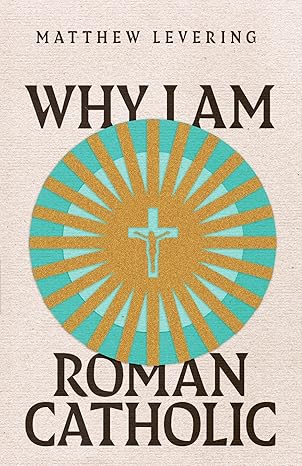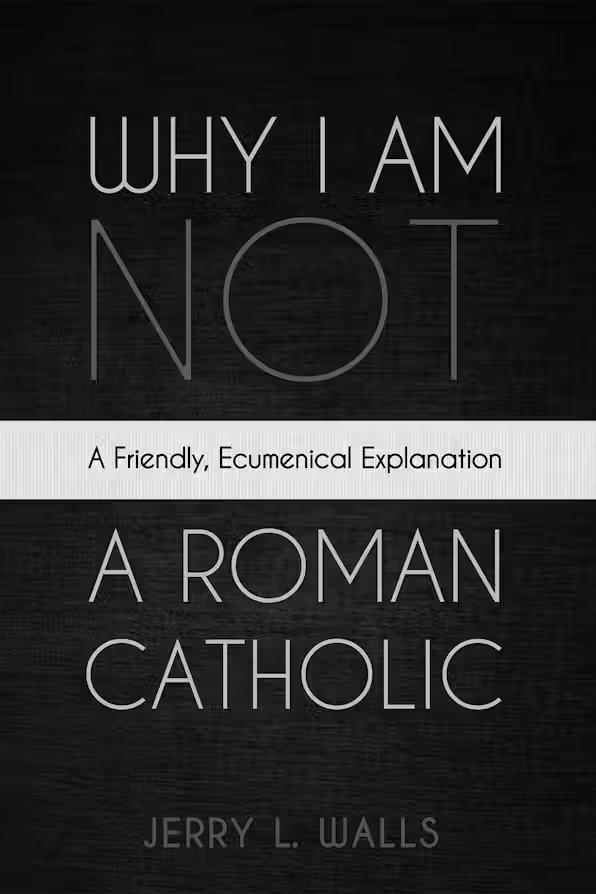A prominent Roman Catholic theologian, Matthew Levering, recently wrote a book entitled 'Why I Am Roman Catholic' (2024). Defending why and why not one is Roman Catholic or Protestant is becoming a literary genre in itself.
![A Roman Catholic church in the United States. / Photo: [link]Josh Applegate[/link], Unsplash, CC0.](https://cms.evangelicalfocus.com/upload/imagenes/683daa4538edf_josh-applegate-A--gGRqNM2c-unsplashCropped.jpg) A Roman Catholic church in the United States. / Photo: [link]Josh Applegate[/link], Unsplash, CC0.
A Roman Catholic church in the United States. / Photo: [link]Josh Applegate[/link], Unsplash, CC0.
A prominent Roman Catholic theologian, Matthew Levering, recently wrote a book entitled Why I Am Roman Catholic (2024). As a result, it was to be expected that a Protestant author would write a mirror book on why not.
It is the case with Jerry L. Walls, Why I Am Not a Roman Catholic. A Friendly, Ecumenical Exploration (Eugene, OR: Cascade Books, 2025), professor of philosophy at Houston Christian University. Actually, Walls did not read Levering’s book beforehand and perhaps wasn’t even aware of it, but it doesn’t really matter. Books and digital resources in the intersection between the Roman Catholic-Protestant divide are mushrooming, and defending why and why not one is Roman Catholic or Protestant is becoming a literary genre in itself.

[photo_footer] Cover of 'Why I Am Roman Catholic' by Matthew Levering (2024) [/photo_footer]
Each book has a story behind it. Walls recalls his. He tells how he participated in different informal dialogues with influential Roman Catholic scholars and theologians, only later realizing that these initiatives were aimed at encouraging conversions to Rome. Reflecting on these experiences and others led him to further clarify why he was not a Roman Catholic, also thinking of the growing number of former evangelicals who have converted to Rome in recent years under the influence of aggressive Roman Catholic apologists who oftentimes use “dubious reasons, spurious arguments, and misinformation”. Walls’s book, therefore, has an apologetic thrust, even though he readily qualifies it in terms of the subtitle: while critical of Roman Catholicism, he wants to write in a friendly and ecumenical way.
Walls is not new in this field. Together with Kenneth Collins, a few years ago, he penned the more substantial tome Roman but Not Catholic: What Remains at Stake 500 Years after the Reformation (2017; my review of the book is here). There, he critiqued Rome for having lost its catholicity (i.e. biblical universality) at the expense and on the altar of its Roman-centered claims. This new book reiterates the same basic critique but adds a new flavor to it.

[photo_footer] Cover of 'Why I Am Not a Roman Catholic: A Friendly, Ecumenical Exploration' by Jerry L. Walls (2025) [/photo_footer] So, why is Walls not a Roman Catholic? Briefly stated: because he rejects both papal infallibility and the Marian doctrines, two doctrinal tenets of the Roman Catholic Church to which Rome has given dogmatic status, something “analogous to the role of the resurrection of Jesus in classic creedal orthodoxy”. The book is a sustained critique of the Roman claims regarding the papacy and Mariology.
As far as the papacy is concerned, Walls takes issue with the dogma of papal infallibility. This papal doctrine is a distillation of Catholic doctrine, yet it is based on faulty history and has generated excessive claims. In sum, Peter was not the first pope, and there was no monarchical bishop in Rome up to the end of the second century.
Moreover, as far as the political role associated with Rome is concerned, “Roman authority rested in no small part on the fact that it had been the capital city, not on an irrevocable conferral of authority by Christ”. Walls’s argument moves on by highlighting the terrible record of the lives of many popes across history, many of whom were corrupted and “very bad men”. To prove the point, he provides a gallery of impious popes who were involved in perverse politics and immoral affairs, thus showing how the historical records are another factor that undermines the dogma. There is no biblical support for the claim that Peter is the first Pope (Walls discusses some exegetical points in Matthew 16 in the Appendix, pp. 181-185), no historical witness up to the end of the second century to back up the role of the bishop of Rome, no spiritual motivations behind his authority other than the political significance of Rome as the capital of the empire.
After quoting and discussing a plethora of Roman Catholic scholars providing contrary evidence to the Catholic claims, Walls argues that papal infallibility lies on too poor foundations to be a binding belief for Christians.
[destacate] “Popular Marian piety in Roman Catholicism has morphed into infallible dogmas that make Mary far more central to the faith than scripture warrants”, writes Jerry L. Walls[/destacate]Moving to the Marian claims, Walls exposes the “Marian maximalism” that led Rome to dogmatize Mary, e.g. the 1854 dogma of the immaculate conception and the 1950 dogma of the bodily assumption, and is still brewing in the prospect of proclaiming her “co-redeemer”. His conclusions are trenchant: “Popular Marian piety in Roman Catholicism has morphed into infallible dogmas that make Mary far more central to the faith than scripture warrants”.After presenting his two main objections to the Roman Catholic Church, Walls deals with apologetic arguments often put forward by popular defenders of the Roman Catholic faith over against Protestants. Oftentimes, we hear the rehearsed saying that if one refuses the authority of the Church of Rome, she becomes her own pope following an individualistic religious path. Although this is a possibility and a danger, the “You are your own pope” type of argument is a caricature of Protestantism. The evangelical faith has historically affirmed the apostolic authority of Scripture, at the same time recognizing degrees of authority in councils and creeds and leaving room for disagreement on secondary issues.
Approaching dialogue in fairness and charity is a constant point made by Walls. In an interesting chapter, he observes that some North American popular Roman Catholic apologists depict Protestantism in straw-man terms, often “comparing the best of Rome with the worst of Protestantism” and presenting Rome as “the panacea for all ills”. To disillusioned evangelicals who are enticed and enchanted by these poor apologetic and golden portraits of Rome, Walls urges them “to resist the Roman fever and to think twice before taking the Tiber plunge”.
The reality is that Rome is not the solid, stable, and unified bullwark that some of its defenders paint it to be. If one only scratches the surface, he can find all types of Catholics (e.g. traditional, cultural, liberal) and all kinds of beliefs and practices in Rome. Indeed, because of their lax views on morality and doctrine, “most Roman Catholics are functional liberal Protestants” because they do not endorse, let alone practice, what their Church teaches them. Walls goes as far as to say that Rome is “a church that is functionally a radically pluralist Protestant denomination” with factions that stand on very different sides, even fighting one another. Compared to it, Evangelical Protestantism in all its denominational diversity is “a far more impressive model of true unity”.
[destacate]The book is a helpful resource for evangelicals tempted to convert to Rome and to Roman Catholics attracted to the evangelical faith[/destacate]The final chapter sums up Walls’s main argument, which is also found in the more extensive 2017 book written with Kenneth Collins. Here it is: Roman Catholicism is not the best form of Catholic Christianity. Actually, it is a “constricted view of catholicity” because it is founded on a “rickety biblical and historical foundation” and is also “rotten in many places because of its recurrent corruption” . With Walls being one of the promoters of the 2017 “A Reforming Catholic Confession”, “Reformed catholicity” or “mere Protestant orthodoxy,” or whatever you want to call it, is for him a far better version of the Christian faith.
Walls’s book is full of fine and well presented apologetic points. Especially his critical remarks on the papacy and the lack of biblical and historical foundations as far as the first two centuries of the church are well argued for. The book also signals a growing awareness in North American evangelical circles that Roman Catholicism is a “competitor” that is gaining strength and making some inroads among disillusioned evangelicals. After years of evangelicals trying to show how much we have “in common” with Catholics (e.g. the “Evangelicals and Catholics Together” initiative) and, more recently, how the “Great Tradition” is our shared platform, it is refreshing to see evangelical scholars engaging Roman Catholicism apologetically, kindly and firmly refuting some of its foundational claims and hinting at far better biblical alternatives.
The book is a helpful resource for evangelicals tempted to convert to Rome and to Roman Catholics attracted to the evangelical faith. More work has to be done to present Roman Catholicism as a fully orbed doctrinal/institutional/sacramental/hierarchical “system” that is not committed to the supreme authority of Scripture (Scripture Alone) and to salvation as a gift of God grounded in the finished work of Christ (Faith Alone).
While using similar languages and categories, the pillars of the Roman Catholic Church are different from the biblical account of the gospel that the evangelical faith seeks to bear witness to.
The Roman Catholic version of the gospel, based on the self-referential authority of the Roman Church and the blurred and distorted message it gives voice to, is a sufficient reason not to embrace the Roman Catholic faith but to stick to the once and for all given “evangel” (good news) of Jesus Christ.
Leonardo De Chirico, theologian and evangelical pastor in Rome.

Las opiniones vertidas por nuestros colaboradores se realizan a nivel personal, pudiendo coincidir o no con la postura de la dirección de Protestante Digital.
Si quieres comentar o